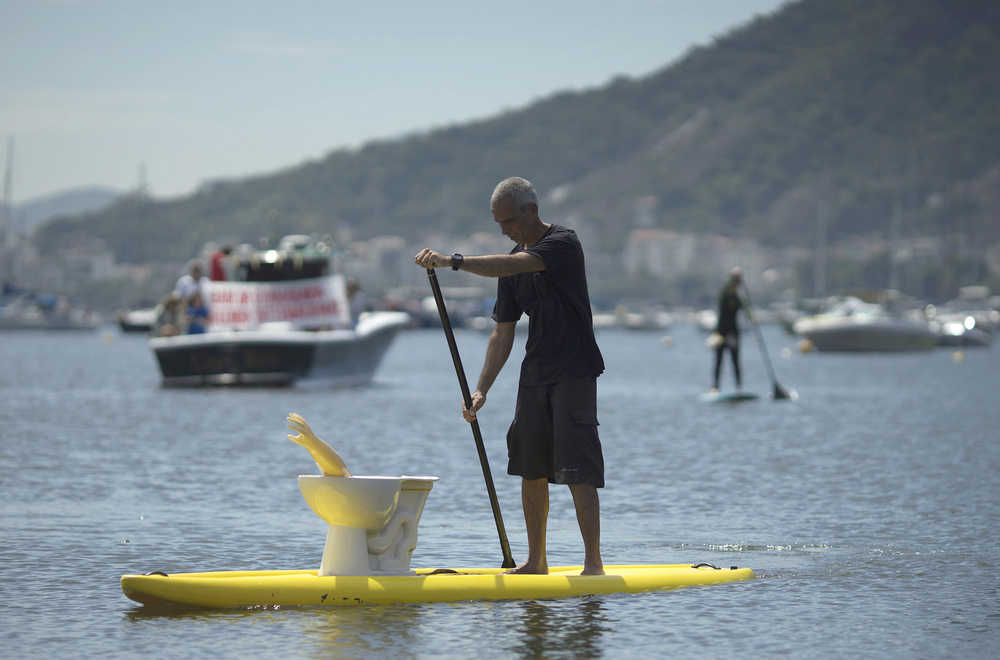LAUSANNE, Switzerland — With five months to go until the Olympics in Rio de Janeiro, the challenges keep piling up.
From the Zika outbreak to severe water pollution, from behind-schedule venues to delayed metro lines, from sluggish ticket sales to cuts in services, from Brazil’s deep financial crisis to impeachment proceedings against its president, the buildup to South America’s first games faces a long list of concerns.
Rio’s final preparations and the status of anti-doping efforts in Russia and Kenya will top the agenda when the International Olympic Committee executive board holds a three-day meeting starting Tuesday in Lausanne, Switzerland.
The board is also expected to discuss progress in identifying refugee athletes who will compete under the IOC flag in Rio, the proposed formation of an independent agency to take over drug-testing for all sports, and plans for the Court of Arbitration for Sport to handle doping sanctions.
With next Saturday marking the five-month countdown to the Aug. 5 opening ceremony at the Maracana Stadium, Brazilian organizers are tackling issues on several fronts. Carlos Nuzman, head of the Rio organizing committee, will give his latest update to the IOC board Wednesday.
Rio is preparing for the games at a time when Brazil is mired in its worst recession since the 1930s, President Dilma Rousseff is fighting impeachment and the country is dealing with a vast corruption scandal centered on state-controlled oil-and-gas giant Petrobras.
If that weren’t enough, Brazil is now at the epicenter of the spread of Zika, the mosquito-borne virus that has been linked to a rise in cases of babies born with abnormally small heads. While the link to microcephaly has not been confirmed, the Zika outbreak has raised concerns among some athletes and fans ahead of the games.
The Centers for Disease Control and Prevention advised Friday that pregnant women consider not going to Brazil and that their male sexual partners use condoms after the trip or abstain from sex during the pregnancy. Women who are trying to become pregnant should talk to their doctors before making the trip, the CDC advised.
The IOC has repeatedly said it is monitoring the situation and following the guidance of the World Health Organization, which has declared Zika a global health emergency but has not issued any travel restrictions for Brazil.
“We’re very confident that the athletes and the spectators will enjoy safe conditions in Rio de Janeiro,” IOC President Thomas Bach said this month.
Other issues facing Rio:
• Delays to the main swimming venue could force a test event scheduled for April 15-20 to be moved to the nearby diving arena. The international swimming federation was already unhappy with reduction in seating at the pool.
• A track cycling test event from April 29-May 1 could be scrapped because of delays to the velodrome, the International Cycling Union has said.
• Also at risk could be the subway line extension connecting the Copacabana and Ipanema beach areas to the western suburb of Barra da Tijuca, where the main Olympic Park is located. The IOC has expressed confidence the $2 billion project will be completed in time.
• Rio’s drug-testing laboratory has until March 18 to meet World Anti-Doping Agency’s guidelines. If it fails, the lab would be declared non-compliant, meaning thousands of doping samples during the games would have to be sent out of Brazil for testing, raising major logistical and financial challenges.
• Athletes remain concerned about pollution in the waterways that will host Olympic competitions. On Saturday, activists staged a symbolic burial of the Guanabara Bay, the sewage-filled waters where sailing will be held. Last week, the local O Globo daily ran a photo of what appeared to be a severed arm floating in the bay.
• Ticket sales have been disappointing, with only about half of the 4.5 million domestic tickets sold as of early this year. The numbers are much worse for the Paralympics, with only 10 percent sold of 3 million tickets.
Also, WADA President Craig Reedie will report to the IOC board on efforts by Russia and Kenya to become compliant with the agency’s anti-doping code, as track and field athletes from both nations risk missing the Rio Games.
The IAAF suspended Russia from global competition in November following a WADA commission report that detailed a vast system of state-sponsored doping and cover-ups. WADA declared Russia’s anti-doping agency non-compliant.
The IAAF says Russia must reform and meet a series of conditions in order to be readmitted. A new Russian anti-doping agency and lab must also be formed and accredited by WADA. Whether Russian track athletes will be reinstated in time for Rio remains uncertain.
Kenya has until April 5 to meet WADA requirements or face being declared non-compliant.

